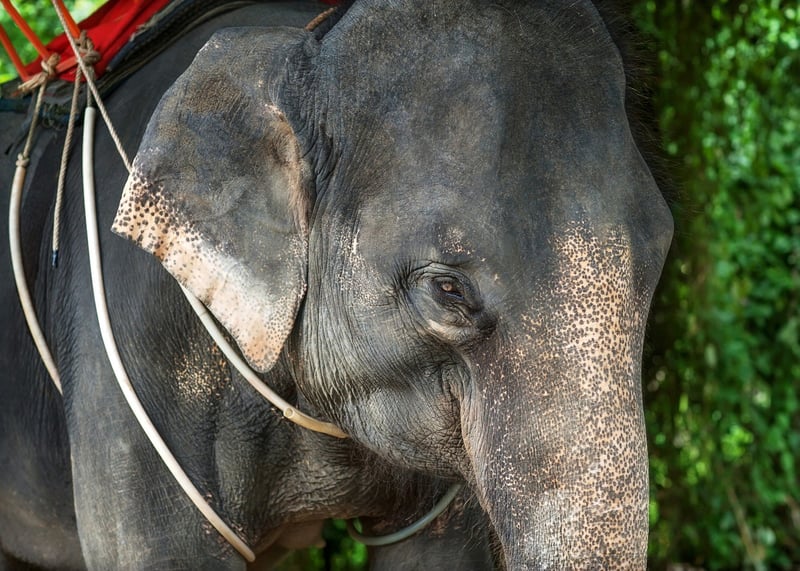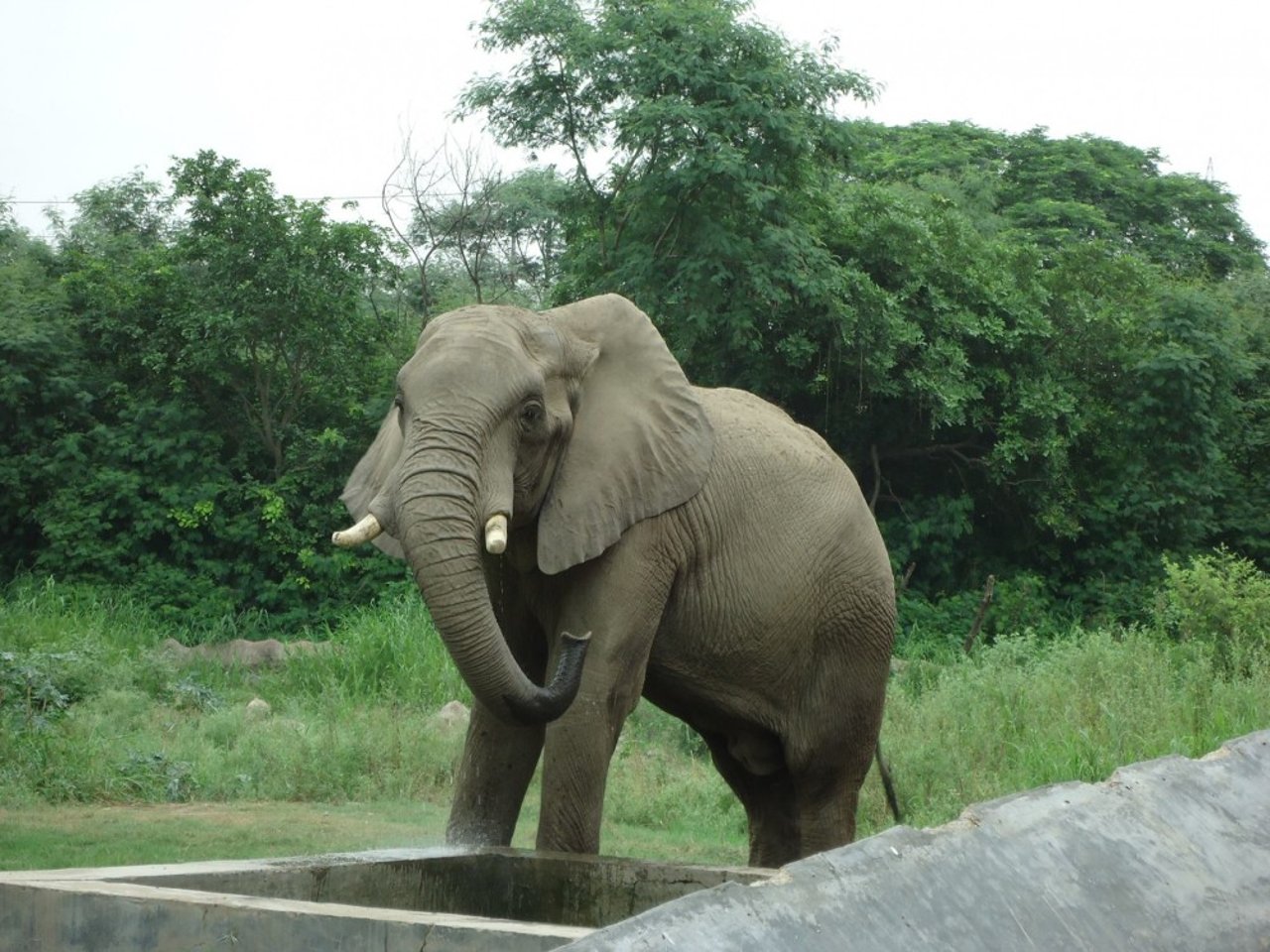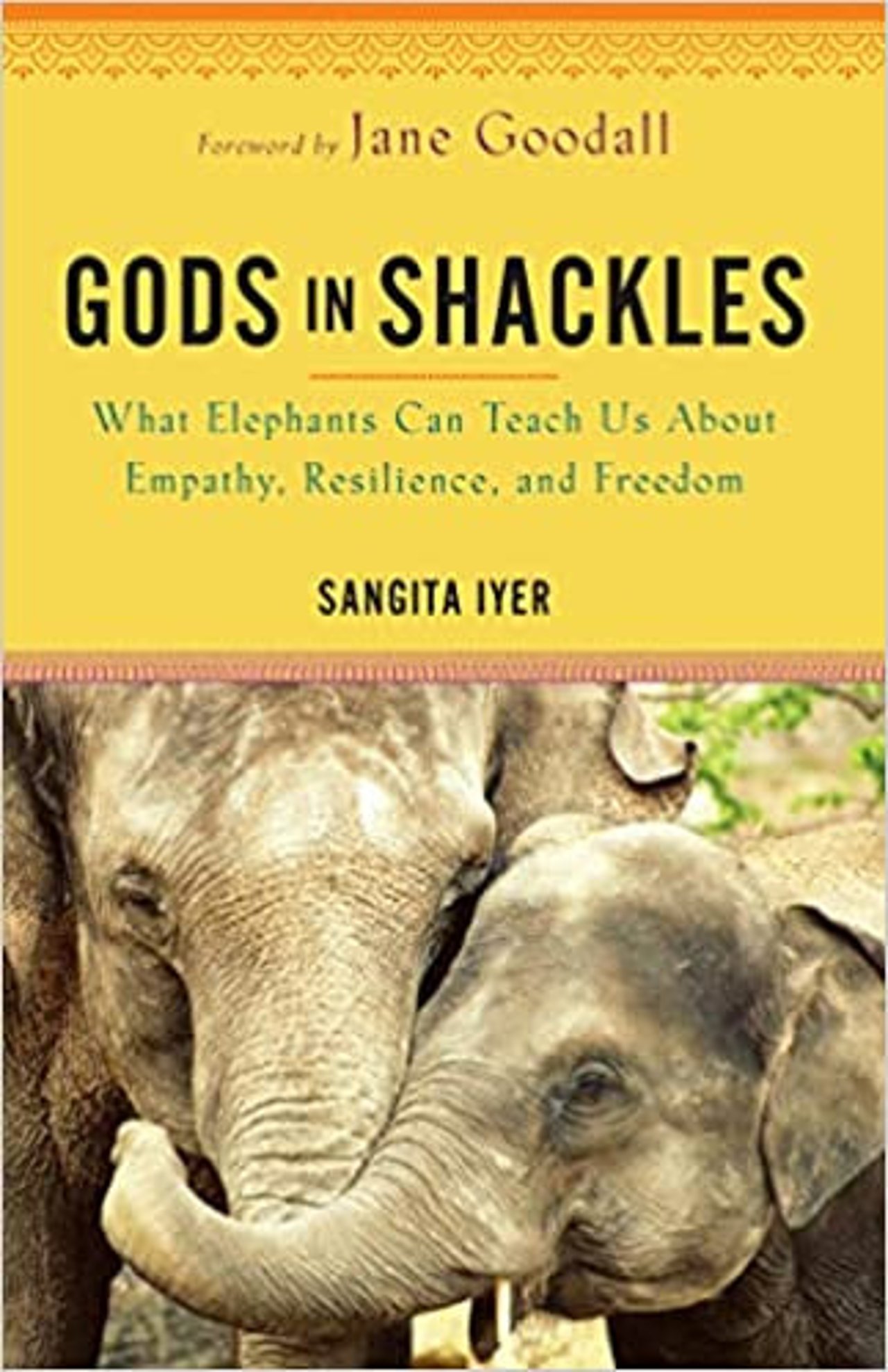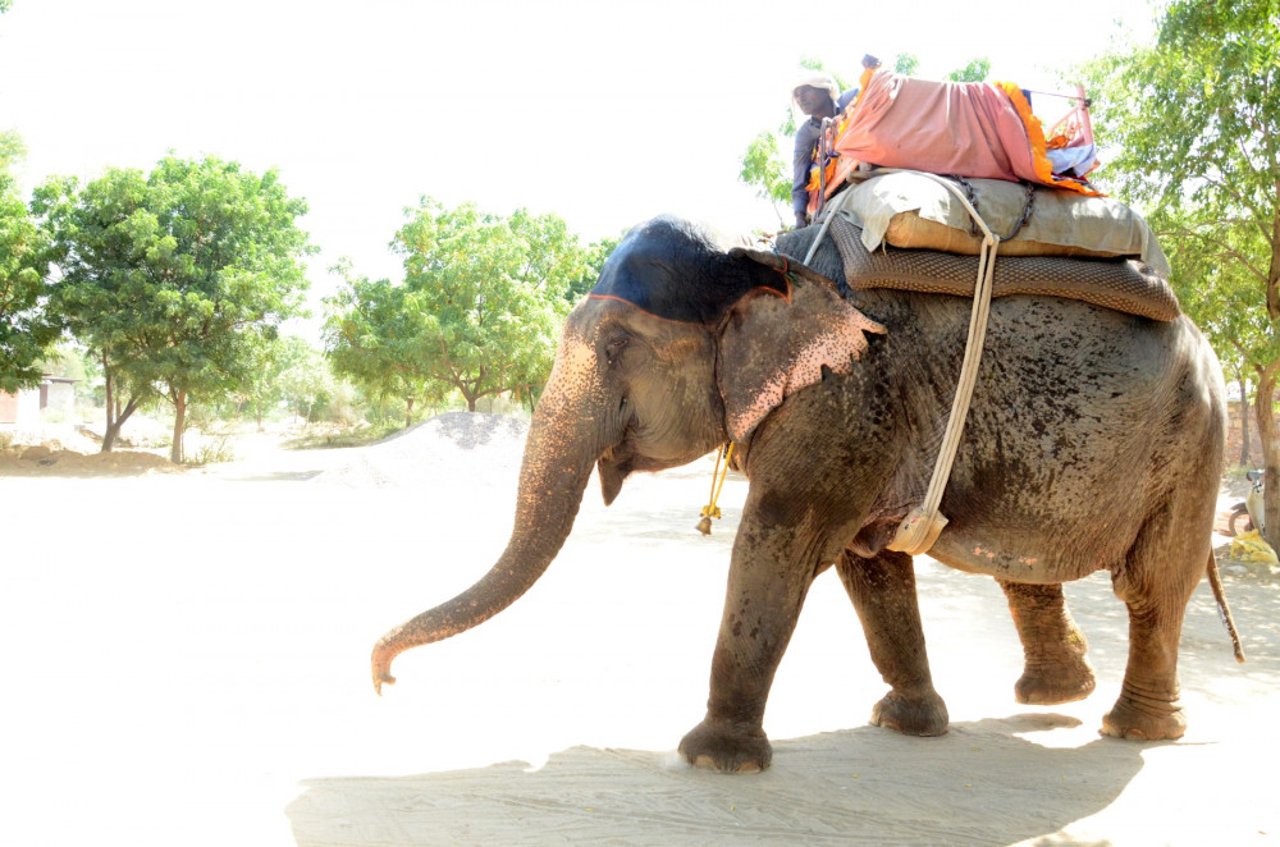
Sangita Iyer is a National Geographic Explorer, multiple award-winning nature and wildlife filmmaker and broadcast journalist, and a biologist. In this interview, she speaks to Wildlife Projects Manager, Shubhobroto Ghosh, on the cruelty being meted out to elephants in various situations, including elephant rides in Amer fort in Jaipur in Rajasthan.
The epic documentary- Gods in Shackles
Sangita has recently produced a 26-part short docu-series about Asian elephants, funded by the National Geographic Society’s storytelling grant. She's also the director and producer of the globally acclaimed epic documentary, "Gods in Shackles", which has garnered 13 international film festival awards. In this interview, she speaks to Wildlife Projects Manager, Shubhobroto Ghosh, on the cruelty being meted out to elephants in various situations, including elephant rides in Amer fort in Jaipur in Rajasthan.
African Elephant Shankar in Delhi Zoo by Shubhobroto Ghosh
Shubhobroto Ghosh : Please give a brief account of your childhood and the background of your interest in animals? Did you grow up with animals in proximity or keep animals as pets?
Sangita Iyer : I was born and raised in a village called Palakkad, Kerala, a place surrounded by lush natural beauty, mesmerizing mountains and magnificent waterfalls. My grandparents used to take me to our family temple where they had a bull elephant with whom I bonded deeply as a child. In fact, when I became a teenager, my grandma used to tell me stories of how they would leave me to play with that bull elephant. And apparently, when I turned 4-years-old, I asked her why that bull elephant had chains on his feet. So, the next week my grandma got me a pair of silver anklets (paayal) and said in a funny way that I too could now wear the chains. But apparently, I went on to argue that the elephant’s front feet were locked and he couldn’t move, whereas I could walk. She said she was rendered speechless. I’ve always felt a special connection with elephants.
Shubhobroto Ghosh :How did you become interested in the captive elephants of Kerala?
Sangita Iyer : After moving to Canada to pursue higher studies and a career in wildlife filmmaking, life took over. But I could never get over my love for this majestic bull elephant. He was like my childhood sweetheart.
Then in 2013 when I returned to India to attend my father’s death anniversary, a chain of synchronicities unfolded, which I have chronicled in my recently released book, ‘Gods in Shackles.’
Gods In Shackles book cover by Sangita Iyer
One thing led to the next and I ended up returning to Kerala where I witnessed the abject misery of the so called “festival elephants”. These voiceless animals were being paraded beneath the scorching sun, deprived of food, water and shelter. With pus oozing out of their massive tumours, and blood dripping from their ankles, caused by chains cutting into their flesh, they were forced to circle the temple altar. The handlers were still not satisfied by their suffering. They constantly jabbed the wounds to inflict maximum agony, so the elephants would obey their commands. As a videographer, I began to film, feverishly, and gathered some 25 hours of footage. After returning to Toronto, I was haunted by the atrocities.Thus I embarked on a journey into the making of my film, ‘Gods in Shackles.’

Shubhobroto Ghosh : During the making of the film, 'Gods In Shackles,' what issues did you want to address regarding the plight of captive elephants?
Sangita Iyer : My main mission was to enlighten the ignorant people who blindly follow the parading elephants without realizing that behind all the glitz and glamour, elephants suffer a lifetime of abuse, neglect, and brutality. I wanted people to know that there are no religious scriptures, especially in the Hindu religion that purports the exploitation of elephants for profit behind the insidious veil of culture and religion. Elephants are considered the embodiment of Lord Ganesha, and they deserve to be revered. But ironically, they are worshipped and defiled at the same time. What a tragic paradox!
Shubhobroto Ghosh : What kind of reception have you received for your film, 'Gods In Shackles?'
Sangita Iyer : Dr. Raman Sukumar, a renowned elephant ecologist, calls the ‘Gods In Shackles’ film an “eye-opener”. World-renowned conservationist, Dr. Jane Goodall said, “I feel sickened and terribly saddened that the elephants are treated in this way in the name of religion.”
Gods in Shackles film poster by Sangita Iyer
But obviously, the lobby groups were threatened by the national and international media attention and they started a smear campaign, as they were concerned about the impact of the film on their pocketbook. Rather than acknowledge the truth and make changes, they began spreading nefarious rumours, because they dreaded that the film would change the public perception after they learn about the dark truth and the harsh realities that elephants suffer.
In the past two years, most of the parades had been cancelled due to COVID, but still the traditions and cultural celebrations continue. It just goes to show that their arguments and justifications that elephants are necessary to preserve the Indian culture is deceptive and aimed at stuffing their own pockets.
Tourists are learning more and more about the plight of elephants and indeed all captive animals, and are boycotting circuses and zoos and other entertainment that involves live animals. Many tour operators are also dissuading their clients from traveling to places that promote animal cruelty.
Shubhobroto Ghosh : What are your thoughts on the elephant rides in Amer fort in Jaipur?
Sangita Iyer : It’s barbaric, inhumane and atrocious! Asian elephants have a protruding spine. It’s not designed to carry heavy weight on their back.
But still, in order to make sure that people are comfortable elephant backs are fitted with howdahs weighing 300 kilos that are tightened severely beneath their tail using crude ropes that rub against their sensitive anus. They are then forced to climb up and down steep steps, carrying heavy people under the sizzling sun. All of the elephants are ailing and deprived of proper food, water and adequate medical treatment. They are constantly tortured with vicious weapons such as bull hooks. Many of them die from heat exhaustion.
Elephant in Haathi Gaon in Jaipur by Shubhobroto Ghosh

Tourists are boycotting elephant rides, and tourism companies like Expedia and others are only promoting “ethical tourism” that involves compassionate treatment of animals. It’s about time India banned elephant captivity once and for all.
There’s a significant lack of awareness regarding the ecological and intrinsic values of elephants. In order to address this significant knowledge gap, I created an organization called Voice for Asian Elephants Society (VFAES) and use films to educate people because knowledge will inspire people to do the right thing.
Shubhobroto Ghosh : Please introduce your new book, 'Gods in Shackles,' and how the book relates to your film and campaigning for animals.
Sangita Iyer : My book Gods in Shackles – What Elephants Teach Us About Empathy, Resilience and Freedom – expounds on details regarding the conditions of specific festival elephants of Kerala who could not be included in the film, while also detailing the journey and the synchronicities that unfolded during the making of my film, ‘Gods in Shackles.’
In a country that worships Lord Ganesh, who embodies the elephants, the remover of all obstacles, why do humans continue to place so many obstacles before the elephants? In a country that birthed ahimsa and calls elephants its heritage animal why are these animals not receiving the protection they deserve? How can we retrace our missteps and get back on track?
My book also has a profound spiritual undertone, as I share my daily practices grounded in rich Hindu philosophies. For instance, I am vegan, and I also share how scriptures from the Holy Bhagavad Gita helped me cope with the profound sadness I felt, witnessing the suffering of elephants.
Shubhobroto Ghosh :Which issues surrounding elephants in India affect you the most and how can these problems be mitigated?
Sangita Iyer : My greatest concern is the loss of habitat caused by the ever-expanding human population and their reckless actions. Irresponsible development, roads and railways cutting through the forests, agriculture, mining and other impulsive actions to sustain the burgeoning human population are destroying the pristine Indian forests, 80% already decimated. Conservation and animal welfare issues have been put in the backburner.
In the past two years, COVID has taught us profound lessons about our interconnections and interdependence on each other and the natural world. The question is, have we learned anything at all? Business can never be as usual after the unprecedented lock ups over the past two years. People have experienced the consequences of captivity, the psychotic behavior that it triggers. It is exactly the same for all captive animals, especially the highly intelligent ones like elephants, dolphins and others.
Shubhobroto Ghosh : What do you think of the work of World Animal Protection in promoting compassion and kindness to animals?
Sangita Iyer : World Animal Protection has been doing amazing work over the past five decades and are one of the key trailblazers of the animal welfare movement. The organization’s campaigns are powerful and incredibly effective, and WAP is creating significant awareness regarding the plight of all animals. I look forward to working with WAP in the future and collaborating on specific projects in India.
You can do your part. Take a pledge to say no to Elephant Rides

Elephants are considered the embodiment of Lord Ganesha, and they deserve to be revered. But ironically, they are worshipped and defiled at the same time. What a tragic paradox!



